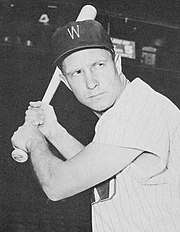Roy Sievers
Roy Edward Sievers (November 18, 1926 – April 3, 2017), was an American professional baseball player. He played in Major League Baseball (MLB) as a first baseman and left fielder from 1949 through 1965. A five-time All-Star, Sievers was the 1957 American League home run leader and RBI champion. He played for the St. Louis Browns, Washington Senators, Chicago White Sox, Philadelphia Phillies, and the expansion Washington Senators. Sievers batted and threw right-handed.
| Roy Sievers | |||
|---|---|---|---|
 Sievers in 1993 | |||
| First baseman / Left fielder | |||
| Born: November 18, 1926 St. Louis, Missouri | |||
| Died: April 3, 2017 (aged 90) Spanish Lake, Missouri | |||
| |||
| MLB debut | |||
| April 21, 1949, for the St. Louis Browns | |||
| Last MLB appearance | |||
| May 9, 1965, for the Washington Senators | |||
| MLB statistics | |||
| Batting average | .267 | ||
| Home runs | 318 | ||
| Runs batted in | 1,147 | ||
| Teams | |||
| Career highlights and awards | |||
| |||
Biography
Sievers was born in St. Louis, Missouri, in 1926; he was nicknamed "Squirrel" as a schoolboy basketball star.[1] He won the American League (AL) Rookie of the Year and TSN Rookie of the Year awards in 1949, batting .306 with 16 home runs and 75 RBI. He struggled to .238 in 1950, and for the next three years he suffered shoulder and arm injuries that limited his playing time to 134 games. He was traded to the Washington Senators for Gil Coan before the 1954 season.

In Washington, Sievers collected 95 or more RBI and played at least 144 games during five consecutive years (1954–58) and made the AL All-Star team three times (1956–57, 1959). His most productive season came in 1957, when he led the league in home runs (42), RBI (114), extra base hits (70) and total bases (331), batting .301. He finished third in the MVP ballot with four first-place votes and 205 points –Mickey Mantle got six and 233, Ted Williams five and 209.[2] On April 4, 1960, Sievers went to the Chicago White Sox in the same trade that sent Earl Battey and Don Mincher to Washington.[3] In his first year with the Sox, he hit .295 with 28 home runs and 93 RBI, and had almost an identical season in 1961, hitting .295 with 27 home runs and 92 RBI, making his fourth All-Star appearance. From 1962 to 1964, Sievers remained productive with the Philadelphia Phillies in the National League. In the 1964 midseason, his contract was sold to the AL expansion Senators, and he played his final game on May 9, 1965.
Sal Maglie, star pitcher for the New York Giants who specialized in throwing the curveball, used Sievers as an example of a curveball hitter in a 1958 article for Sports Illustrated.[4]
At the time of his death in 2017, Sievers was the oldest living member of the expansion Senators team. At a time when achieving 300 home runs was still a rarity, he became only the 22nd ballplayer to reach the plateau. He also shares the dubious distinction with Gil Hodges of being one of the first two major leaguers to hit 300 career home runs and not make the Baseball Hall of Fame. Sievers hit his 300th home run on July 19, 1963. Hodges hit No. 300 on April 23, 1958. In a 17-season career, Sievers was a .267 hitter with 318 home runs, 1,703 hits, and 1,147 RBI, in 1,887 games. Defensively, he compiled a career .989 fielding percentage. After his playing career ended, he served one season (1966) as a coach for the Cincinnati Reds and managed in the minor leagues. Sievers was one of only nine players to don the uniform of both the original and expansion Washington Senators teams, the others being Rudy Hernández, Héctor Maestri, Don Mincher, Camilo Pascual, Pedro Ramos, Johnny Schaive, Zoilo Versalles, and Hal Woodeshick.
Sievers died in his home in Spanish Lake, Missouri, on April 3, 2017, aged 90.[5][6]
Highlights
- 4-time All-Star (1956–57, 1959, 1961)
- AL Rookie of the Year (1949)
- Set seasonal and career records in home runs for the Senators:
- 42, in 1957
- 180, in 3547 at-bats
Top 10 AL leaderboards and awards
- 3-time MVP vote (1957–58, 1960)
- 3-time in batting average (1949, 1957, 1960)
- 6-time in home runs (1954–58, 1960)
- 7-time in RBI (1949, 1954–58, 1960)
- 4-time in runs (1956–58, 1960)
- 7-time in extra base hits (1954–58, 1960)
- 6-time in slugging (1949, 1955, 1957–58, 1960–61)
- 4-time in intentional walks (1956–60)
See also
References
- "Roy Sievers dies at 90; St. Louisan was AL Rookie of Year with Browns". St. Louis Post-Dispatch. April 4, 2017. Retrieved April 5, 2017.
- "Baseball Awards Voting for 1957". Baseball-Reference.com. Retrieved 2009-01-08.
- "Roy Sievers from the Chronology". BaseballLibrary.com. Archived from the original on 2011-06-04. Retrieved 2009-01-08.
- Terrell, Roy (March 17, 1958). "Part 1: Sal Maglie on the Art of Pitching". Sports Illustrated. Retrieved August 7, 2020.
- Chris Cwik (April 4, 2017). "Roy Sievers, MLB's first AL Rookie of the Year Award winner, dead at 90". Yahoo Sports. Archived from the original on 2017-04-05. Retrieved April 4, 2017.
- Goldstein, Richard (April 4, 2017). "Roy Sievers, Slugging Washington Senator in the '50s, Dies at 90". The New York Times. ISSN 0362-4331. Retrieved 2017-04-14.
External links
- Career statistics and player information from MLB, or ESPN, or Baseball-Reference, or Fangraphs, or Baseball-Reference (Minors), or Retrosheet
- Roy Sievers at SABR (Baseball BioProject)
- Roy Sievers at Baseball Almanac
- Roy Sievers at Baseball Library
- Roy Sievers at Find a Grave
| Sporting positions | ||
|---|---|---|
| Preceded by Frank Oceak |
Cincinnati Reds first base coach 1966 |
Succeeded by Jim Bragan |